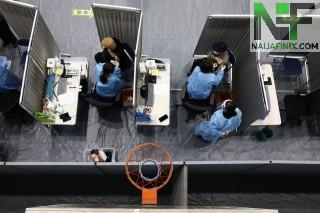South Korea is in talks with mRNA vaccine makers including Pfizer (PFE.N) and Moderna (MRNA.O) to produce COVID-19 shots in the country and is ready to offer the capacity to make up to 1 billion doses immediately, a senior government official said.

The plan, if agreed, would help ease tight global supply of COVID-19 vaccines, particularly in Asia which lags North America and Europe in vaccine rollouts, and put South Korea a step closer to its ambition to become a major vaccine manufacturing centre.
South Korea already has deals to locally produce three coronavirus vaccines developed by AstraZeneca (AZN.L)/Oxford University, Novavax (NVAX.O), and Russia. It also has a vaccine bottling and packaging deal with Moderna.
“We’ve been holding frequent talks with big pharmaceutical companies to produce mRNA vaccines,” Lee Kang-ho, director general for the global vaccine hub committee under South Korea’s health ministry, told Reuters in an interview.
“There are only a few mRNA vaccine developers – Pfizer, Moderna, CureVac and BioNTech. Thus there’s a limit to how much they can produce to meet global demand… South Korea is keen to help by offering its facilities and skilled human resources,” Lee said.
It’s not immediately clear how advanced these talks are and whether and when a deal will be agreed.
BioNTech (22UAy.DE) declined to comment, Moderna and CureVac (5CV.DE) did not reply to Reuters’ requests for comments.
A Pfizer spokesperson said the company is making efforts to enhance its COVID-19 vaccine supply chain but added “we do not have anything specific to announce at this time.”
Lee declined to name local vaccine makers which have the capacity to produce mRNA vaccines immediately, but a government source said they include Hanmi Pharmaceuticals Co Ltd (128940.KS) and Quratis Co Ltd.
Hanmi confirmed that it has a big capacity reserved for Sanofi’s (SASY.PA) diabetes drug and it can be used for COVID-19 vaccine production as the Sanofi project has stalled.
Quratis, which makes a tuberculosis vaccine, said its new factory built last year can now be used for mRNA vaccine production.
Reuters


Share your thoughts